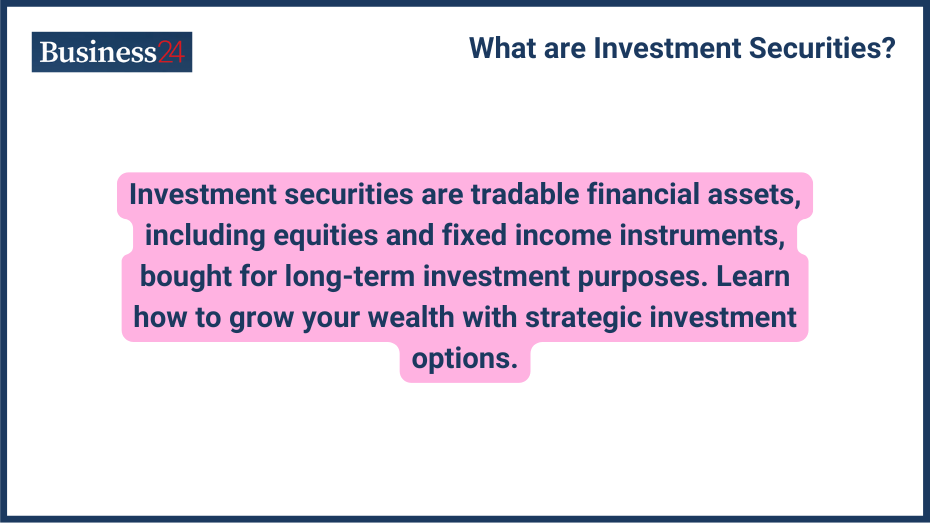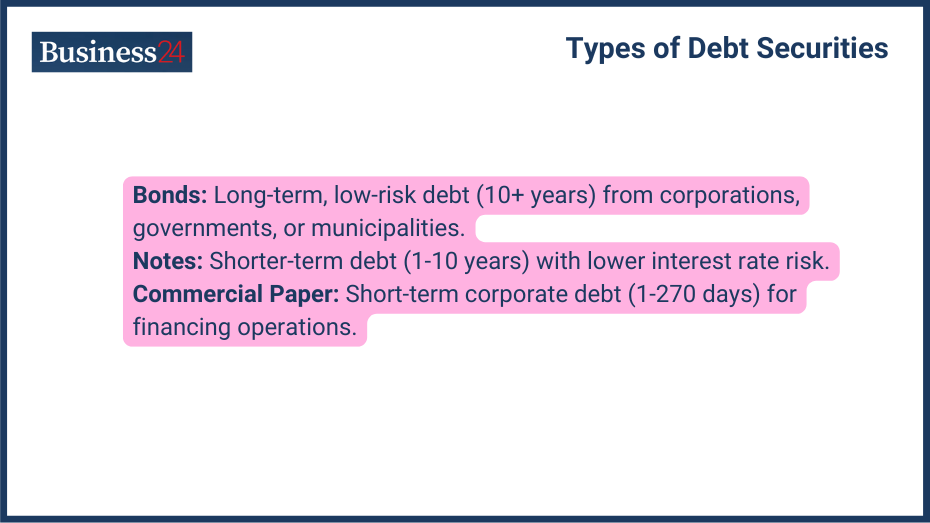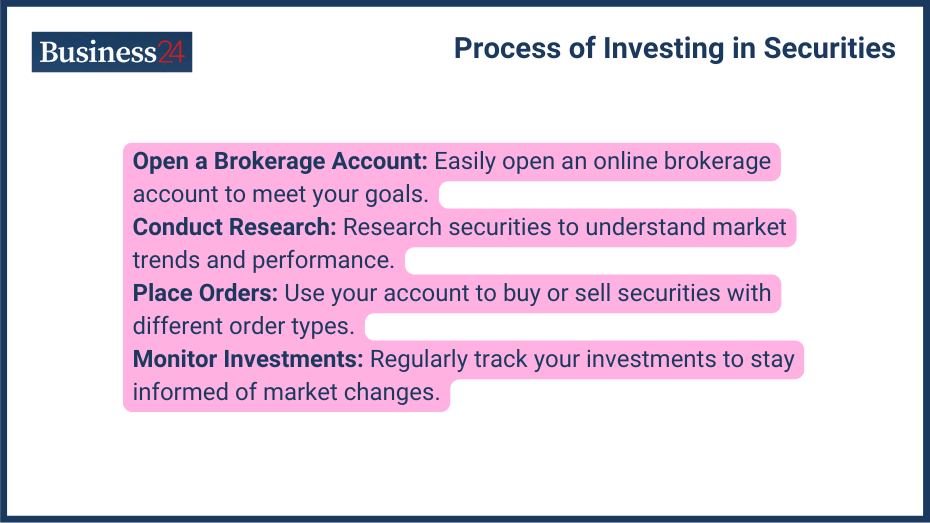
Investment securities are tradable financial assets, including equities and fixed income instruments, bought for long-term investment purposes. Learn how to grow your wealth with strategic investment options.
Investment securities are various financial assets that can be bought and sold in financial markets. Corporations, governments, and other entities introduce investment securities to raise funds for various purposes, ranging from business expansion to infrastructure development.
These investment securities allow investors to participate in the economic growth of businesses and governments and to earn an attractive return on investment.
What is an Overview of Investment Securities?
Investment securities gain value from underlying economic activities or legal agreements with the government. They are a way for businesses and other bodies to raise funds from those who want to participate in the development of specific companies or projects. By investing in securities, individuals and institutions can put their savings or surplus funds into different asset classes to grow wealth, generate income, or diversify their portfolios.
Types of Investment Securities
Investment securities encompass a wide range of financial instruments, each with distinct characteristics and risk-reward profiles. Majorly investment securities are categorized into two broad types:
- Debt Securities: Debt securities are loans made to borrowers with the expectation of receiving periodic interest payments and the whole principal amount at a predetermined maturity date. Debt securities can range from short obligations like commercial papers to long-term instruments like bonds.
- Equity Securities: Equity securities are the most famous investment assets in the world; stocks are a major example of equity securities. Equity securities give ownership stakes in corporations, granting shareholders the right to participate in the company’s profits and assets.
There are two types of stocks: Common stock, which carries voting rights, and preferred stock, which typically offers fixed dividend payments and priority over common stockholders in asset liquidation, which are equity securities.
What are Debt Securities?
As I explained earlier, debt security is a contractual agreement between a borrower, the issuer of the debt securities, and a lender who wants to invest in those debt securities. The main feature of debt security is the certainty of fixed periodic returns and the eventual repayment of the principal amount at maturity.
Whenever companies or government bodies want to raise money without diluting equity, they issue bonds. Bonds are the most common form of debt security, and the bond market is the biggest market in the world.
Types of Debt Securities

Some of the common debt securities:
- Bonds: Bonds are the most famous debt securities and high-rated bonds are considered a very safe form of instruments. Long-term debt instruments are issued by corporations, governments, or municipalities, typically with maturities exceeding ten years.
- Notes: Notes are similar to bonds but with shorter maturities, typically ranging from one to ten years. Notes are generally considered to have lower interest rate risk compared to bonds.
- Commercial Paper: These are short-term unsecured debt instruments issued by corporations to finance working capital needs. Companies commonly issue it to finance their payrolls, payables, inventories, and other short-term liabilities. Maturities on commercial paper range from one to 270 days, with an average of around 30 days.
Features of Bonds
- Issue Date: This is the date on which the debt security is initially issued to the public.
- Coupon Rate: Coupon rate is the term used for the fixed interest rate paid by the issuer to the bondholder.
- Maturity Date: The date on which the principal amount of the debt security is repaid to the investor is known as the maturity date.
- Yield-to-Maturity (YTM): The total return anticipated on a bond if held until its maturity date, considering the bond’s current market price, coupon rate, and time to maturity.
What are Fixed-Income Securities?
Fixed-income securities are debt securities that provide regular fixed-income pay, as explained in the above section. They are investment instruments where the issuer, like a government or corporation, promises to pay regular interest and return the principal amount when the security matures. For investors, these securities offer a reliable source of income and help preserve capital.
What are Equity Securities?
Equity is a part of the company’s total worth; one unit, meaning one stock, gives you part ownership in the company. By owning the company’s share, you are entitled to a portion of the company’s profits, assets, and voting rights. Equities allow companies to raise money while investors can grow their money with the growth of the company.
Common Stock vs. Preferred Stock
Two primary types of stocks available are:
- Common Stock: These are simple shares of a company that you can invest in. They grant the holders voting rights so they can participate in corporate decision-making. Common stockholders have a residual claim on the company’s assets and earnings after all other claims, including those of preferred stockholders and creditors, have been satisfied.
- Preferred Stock: This type of equity security is hybrid, combining characteristics of debt and equity. Preferred stockholders have priority over common stockholders in terms of dividend payments and asset distribution in case of liquidation. However, they typically do not possess voting rights.
What is the Comparison of Debt and Equity Securities?
Debt and equity securities represent two fundamental pillars of the investment sector, each offering distinct characteristics, risk profiles, and return expectations. Equity securities generally carry higher risk compared to debt securities, but they also offer the potential for higher returns through capital appreciation and dividend payments. Debt securities typically offer lower risk and more predictable returns in the form of interest payments.
In the event of a company’s liquidation, debt holders have priority over equity holders in claiming assets and receiving payments. Equity holders’ claims are subordinate to those of creditors. Debt securities have a defined maturity date, at which point the principal amount is repaid to the investor. Equity securities have no maturity date, as ownership is perpetual unless the shares are sold.
Also, there are legal differences between debt and equity securities. Debt is more like a contract obligation with fixed terms and conditions, including interest rates, maturity dates, and repayment terms. While equity does not have any promises or contracts, it is just an investment for growth.
What is the Process of Investing in Securities?

Step-by-step procedure on how to buy and sell securities:
- Open a Brokerage Account: Opening a brokerage account nowadays has been very easy; you can open a brokerage account online according to your needs and goals.
- Conduct Research: For successful investing, thorough research on the securities is very important. With the analysis, you can understand the market trends, financial statements, and performance of the securities.
- Place Orders: Once you have made your investment decision, you can place orders to buy or sell securities through your brokerage accounts. Various order types are available, such as market orders, limit orders, and stop orders, allowing investors to specify their desired price and execution conditions.
- Monitor Investments: After you have made an investment, this is not the end. It is very important that you track your investments continuously. Various events and trends in the market affect investments, and you should be aware of them.
Role of Brokers and Exchanges
You cannot directly buy or sell securities; brokers are the medium through which you place your trades. Brokers provide access to various securities and other benefits, like investment advice. With brokers, exchanges also play a very significant role in the investment landscape; they provide investors with a platform on which they can trade and invest.
Securities exchanges, such as the New York Stock Exchange (NYSE) and Nasdaq, provide a platform for the trading of securities, ensuring fair pricing and efficient market operations.
Regulatory Considerations
The investment industry is prone to scams and thefts, and regulatory bodies are necessary to control these scams. The Securities and Exchange Commission (SEC) in the United States and similar regulatory bodies in other countries oversee the securities industry, enforcing rules and regulations to ensure fair and transparent markets.
What are the Benefits of Diversification in Securities?
The reason is simple: If you put all your money into a single security and it fails for any reason, there is a chance of major capital losses. If you are invested in different securities of different cycles and sectors, loss from one can be subsided from another. By making a portfolio comprising different asset classes, such as stocks, bonds, and real estate, investors can reduce the impact of adverse performance in any single asset on the overall portfolio.
Strategies for Diversifying Portfolios
- Asset Allocation: To minimize risk, you can distribute investments across different asset classes, such as stocks, bonds, cash, and alternatives.
- Geographic Diversification: Investing in securities from different countries or regions to reduce exposure to economic conditions in a single country will help mitigate risk and diversify investments in different economies.
- Industry Diversification: Spreading investments across various industries to mitigate the impact of sector-specific risks.
- Security Selection Diversification: Investing in a variety of securities within each asset class to reduce company-specific risk.
What are the Risks Associated with Investment Securities?
Different securities provide different returns, and the risk associated with securities ranges from high to low. Common risks associated with investment securities are:
Market Risk
Market risk, also known as systematic risk, is the fluctuations in the overall market that can impact the value of securities. Economic conditions, interest rate changes, investor sentiment, and geopolitical events can all contribute to market risk. Diversification across different asset classes can help mitigate market risk.
Credit Risk
Credit risk is the possibility that an issuer of a debt security may default on its obligations, resulting in financial losses for investors. This risk is particularly relevant for bonds and other debt instruments. Credit rating agencies assess the issuer’s creditworthiness, and investors should carefully evaluate the credit quality of their investments.
Interest Rate Risk
Interest rate risk affects the value of fixed-income securities. When interest rates rise, the value of existing bonds typically declines, as investors can purchase newly issued bonds with higher coupon rates. Conversely, when interest rates fall, the value of existing bonds tends to increase. Interest rate risk is a significant factor for bond investors.
Liquidity Risk
Liquidity risk refers to the ability to sell an investment quickly and at a fair price. Some securities, such as those issued by small companies or those in niche markets, may have lower liquidity, making it difficult to sell them without a significant price impact. Diversifying investments across different asset classes and securities can help mitigate liquidity risk.
Disclaimer
eToro is a multi-asset platform which offers both investing in stocks and cryptoassets, as well as trading CFDs.
Please note that CFDs are complex instruments and come with a high risk of losing money rapidly due to leverage. 61% of retail investor accounts lose money when trading CFDs with this provider. You should consider whether you understand how CFDs work, and whether you can afford to take the high risk of losing your money
This communication is intended for information and educational purposes only and should not be considered investment advice or investment recommendation. Past performance is not an indication of future results.
Copy Trading does not amount to investment advice. The value of your investments may go up or down. Your capital is at risk.
Crypto assets are complex and carry a high risk of volatility and loss. Trading or investing in crypto assets may not be suitable for all investors. Take 2 mins to learn more
eToro USA LLC does not offer CFDs and makes no representation and assumes no liability as to the accuracy or completeness of the content of this publication, which has been prepared by our partner utilizing publicly available non-entity specific information about eToro.